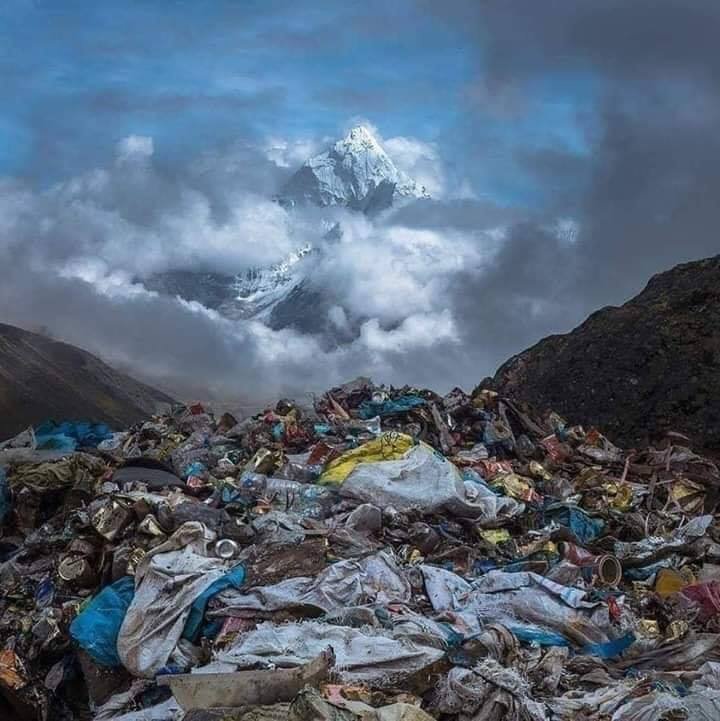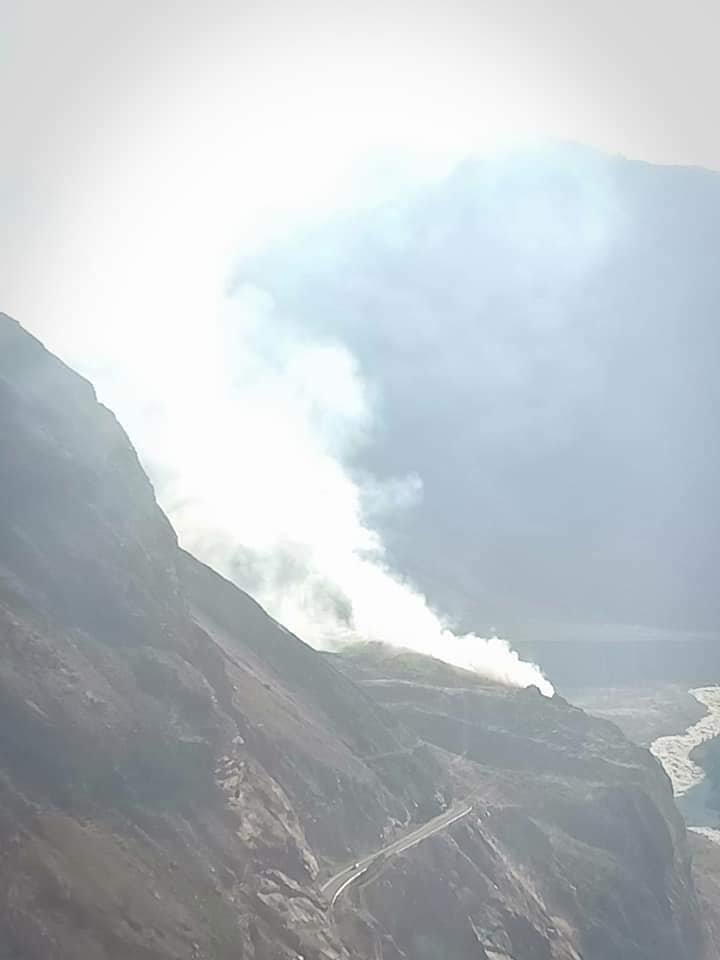Hunza valley has suffered the most due to unplanned tourism and unending greed for money and profit. The valley is being sold out to tycoons of hospitality industry, land mafias and tax evaders, writes Amir Hussain in his latest column in The News.

All praise to nature for endowing the land of Gilgit-Baltistan (GB) with magical beauty. Accentuated by topographical diversity, seasonal variations and demographic plurality GB presents a unique cultural and geographical mosaic for visitors from across the world.
GB has a meagre population of 1.4 million but, astonishingly, people there speak 10 different languages with unique etymology. Urdu is, therefore, the lingua franca between various ethnic groups even within a radius of 10 kilometers. Situated in the lap of one of the highest mountain ranges of the world, this region is full of pastures, meadows and rugged snow-covered peaks.
Last week, I visited the Gapa valley in the Nagar district of GB on a hiking mission and it was one of the most exhilarating experiences of my life as a hiker. It was as though nature was staring at me to remind me of the miseries inflicted upon it by human beings through intrusion elsewhere in GB. Thankfully, the Gapa valley has not been intruded by humans with their greed for money and profit so far.
Those who plan to visit Gapa I have one advice for them: please do not destroy the serenity of this land; it is not a dumping ground for the filth we humans have produced in other tourist spots of Pakistan. GB is now turning into a dumping site of garbage that we humans produce due to sheer irresponsible social behaviour. ‘Voyeuristic feelings more than a sense of adventure cause many to visit this region, stemming from the fabricated stories of easy mingling of opposite sexes’, says a local anthropologist in Hunza.
Back in 2001, as a fresh graduate I joined a Japanese-funded school in Karimabad, Hunza as an English language teacher in addition to my job as a newspaper reporter with an English language daily. My job as a teacher was part altruism and part income support to my meagre earnings as a newspaper reporter. Eighteen years have gone since then and this summer I had a chance to revisit Karimabad and I was devastated to see the miseries heaped upon this summer resort. The old Baltit, which was renamed as Karimabad has now lost its lustre and has become a summer transit camp of unplanned tourism. The royal Baltit town has now become a dusty and crammed place where you feel claustrophobia in the midst of noisy traffic and dust emitting dilapidated road infrastructure.
Just beneath the royal palace the ordinary toiling and hardworking Hunzukutzs (people of Hunza) strive to make a living by selling local souvenirs to tourists while the big hoteliers are busy fleecing well-off tourists. Hunza is entering into a serious crisis of fraying social fabric with a sense of false pride of being developed. Like any other unplanned and underdeveloped tourist destination in the world, Hunza is on the verge of being turned into a sprawling concrete jungle driven by greed and deceit. The lovely, hospitable and educated people of Hunza are losing their land and social space to exotic economic greed and colonization of their indigenous resources by the tycoons of the hospitality industry, land grabbers and tax evaders

The average government spending in infrastructure, education, health and other basic social services is one of the lowest in the Hunza district as compared to other districts of Gilgit-Baltistan. The whole district is plunged into darkness for 16 hours daily with severe power crisis despite the fact that it has enormous potential to produce more than 20,000 megawatts of energy from the water resources only. With almost zero investment from the provincial government Aliabad and Karimabad, the largest towns of Hunza district, face a severe water and power crisis.
In Lower Hunza, a contract was granted some four years back by the government for the construction of a 6 kilometres long blacktop road to connect the Shinaki villages to the Karakorum Highway but it has not been completed yet. A micro-hydro power generation project of 500 KW was commissioned in the Mayoon village of Lower Hunza in 2016 by the government of GB but it has become a work-in-progress project for the last three years. These are just a few examples. Hunza is no more a chosen place for an aspiring young Huzukutz as it does not offer any viable opportunity to live a decent life. The mass exodus of young people from Hunza suggests that the claims of development agencies in achieving sustainable social development and investments in improving the quality of life were untenable in the long run.
Also read: Unethical tourism. https://www.dawn.com/news/1496251
The story of Hunza is not only a lamentation of its human induced miseries, it also has a lesson for those of us who claim to advocate preservation of natural assets in the ecologically sensitive regions like Gilgit-Baltistan. Beyond Hunza, there is much to be preserved and it is the right time to realize this. Tourism is not a destructive force; it is one of the most lucrative economic activities to benefit local people, but it has to be managed and governed with great responsibility. The government must invest to mitigate the environmental and social cost of tourism and it must introduce locally viable regulation to help benefit people without losing their indigenousness. While Hunza is devastated by unregulated tourism, we must now prevent other valleys of Gilgit-Baltistan from following suit. The ecological resources in the valleys of Ghizar and Nagar are next in row for being overrun by tourists without regulation.
I was never deeply impressed by the poets of the Romantic era because of their nostalgic and backward-looking approach to life but let me confess that my last journey of Hunza valley forced me to rethink my convictions. Those who have read the poems dedicated to nature by Wordsworth will not resist romanticizing the beauty of the world beyond urban life. What makes this great poet of romanticism relevant to our times is the perennial impact of his genius to capture the subtleties of nature. The genius of this great poet lies in his ability to capture the best of imagination despite the limitations of language – and more so in case of the English language. However, ingenuity is not a gifted trait; it is cultivated and nurtured with consistent artistic engagement with the world of nature.
If imagination is more powerful than language then it needs mastery over language to manipulate it for expressing feelings which cannot be captured in our mundane utterances. This takes nothing less than the genius of great poets like Wordsworth. There are also many unsung poetic geniuses who lived and died unknown because they were not born into the big civilizations of their time. In all languages and dialects of marginal societies there has been enormous talent of organic poetic expressions far away from the civil sensibilities of Europe. I can recall unknown poet Imtiaz Ali Shaiki whose poetry in the Shina language provides some amazing mix of organic imagery and symbolism to express disdain against a rapidly urbanizing GB. It would take a series of articles to analyze the poetics of Imtiaz Ali Shaiki but the gist of message emanating from his poetry of nature is simple: happiness lies in being close to nature.
 Amir Hussain is an Islamabad-based social development and policy adviser, and a freelance columnist. He can be reached at: ahnihal@yahoo.com
Amir Hussain is an Islamabad-based social development and policy adviser, and a freelance columnist. He can be reached at: ahnihal@yahoo.com

The High Asia Herald is a member of High Asia Media Group — a window to High Asia and Central Asia
